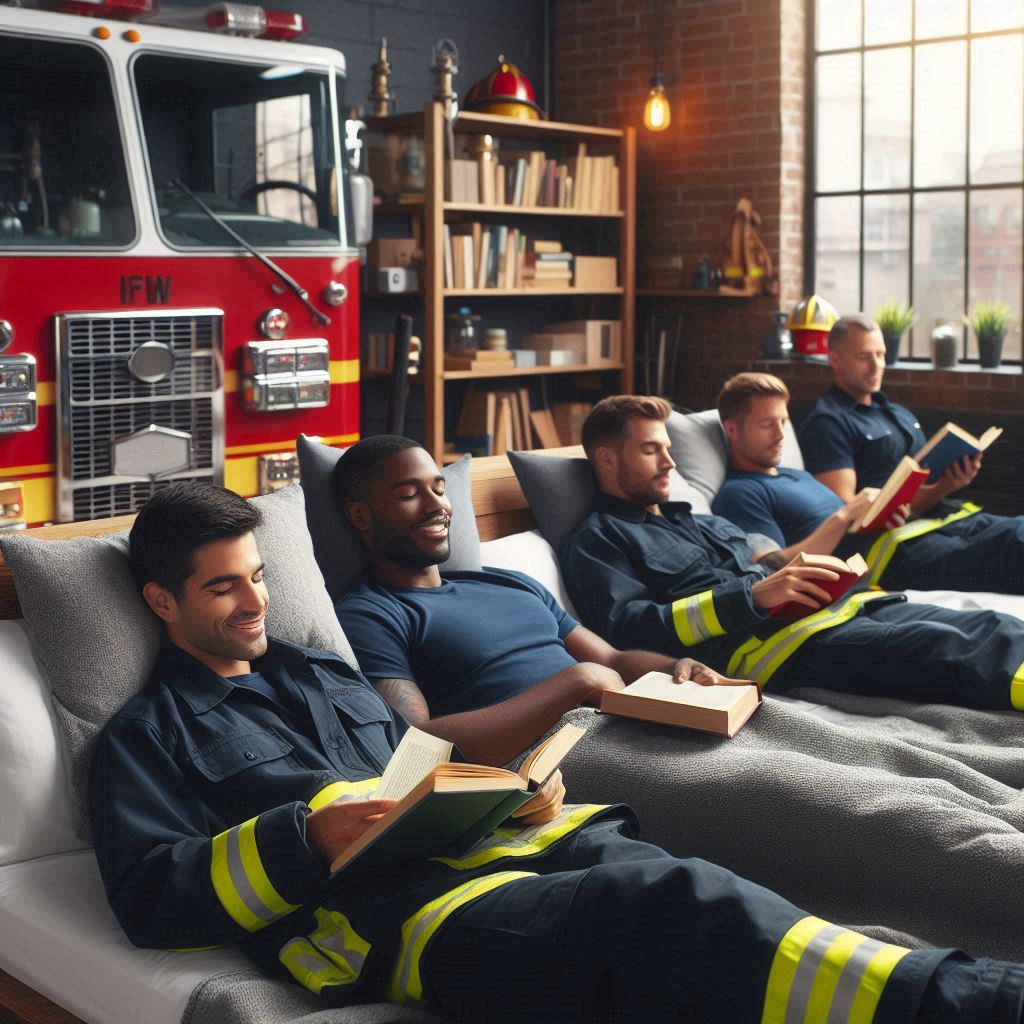
As a seasoned firefighter, I often get asked the burning question – do firefighters actually sleep at the station? Let’s dive into this intriguing topic and uncover the truth behind the sleeping habits of these brave first responders. The idea of firefighters catching some shut-eye amidst the chaos may seem puzzling, but there’s more to it than meets the eye.
When the alarm sounds in the dead of night, do firefighters jump out of bed fully rested and ready to go? Or do they rely on quick power naps between calls to recharge? Join me as we explore the reality of sleep for firefighters at the station and how they balance the demands of their intense profession with much-needed rest. Let’s debunk the myths and shed light on the fascinating world of firefighting sleep patterns.
Key Takeaways
- Quality sleep is crucial for firefighters: Lack of sleep can impair cognitive function and physical abilities, emphasizing the importance of well-rested first responders.
- Fire stations have designated sleeping areas: These spaces are equipped with comfortable amenities to allow firefighters to rest between emergency calls and maintain operational readiness.
- Challenges of sleeping at the fire station: Firefighters face obstacles like interrupted sleep, noise levels, unpredictable schedules, comfort issues, and stress that can impact their resting patterns.
- Strategies for quality sleep between calls: Implementing consistent sleep schedules, creating a comfortable sleep environment, limiting caffeine intake, utilizing relaxation techniques, and incorporating short naps can help firefighters optimize their rest at the station.
- Understanding the reality of firefighters’ sleep patterns: Firefighters work long and irregular shifts, often experiencing sleep disturbances and insomnia. Prioritizing rest and implementing sleep optimization strategies is vital for their well-being and job performance.

The Importance of Sleep for Firefighters
As a firefighter, sleep is crucial for my performance and well-being. Lack of sleep can impair cognitive function, decision-making, and physical abilities. For us, being well-rested is not just a luxury but a necessity to effectively respond to emergencies.
Studies have shown that sleep deprivation can lead to decreased alertness and slower response times. In a profession where quick thinking and swift actions can make a life-saving difference, adequate rest is paramount.
Sleep deficiency not only affects individual firefighters but can also impact the entire team’s effectiveness during operations. It is essential for all team members to prioritize rest to ensure peak performance when facing high-stress situations.
Firefighters often work long shifts, respond to calls at any hour, and experience interrupted sleep patterns. Despite these challenges, establishing healthy sleep habits and creating opportunities for rest at the station can significantly improve overall job performance and well-being.
In the next section, I’ll delve into strategies that firefighters use to optimize sleep quality and manage rest while on duty.
Do Firefighters Have Designated Sleeping Areas?
Firefighters often work extended shifts and need to be prepared to respond to emergencies at a moment’s notice. To ensure they are well-rested and ready for action, fire stations typically have designated sleeping areas where firefighters can grab some rest between calls.
In my experience, fire station layouts vary, but most modern stations are designed with sleeping quarters in mind. These designated areas are equipped with bunk beds, lockers for personal belongings, and sometimes individual sleeping pods for added privacy.
Having dedicated sleeping spaces allows firefighters to recharge during downtime, enabling them to perform at their best when duty calls. It’s crucial for firefighters to have a comfortable and conducive environment for rest to prevent sleep deprivation and maintain optimal mental and physical performance.
In some cases, especially in larger stations, there may be multiple sleeping areas to accommodate different shifts and ensure that firefighters have a quiet place to rest regardless of the time of day. This practice aligns with circadian rhythms and supports healthy sleep patterns for those working irregular hours.
Overall, having designated sleeping areas at fire stations is essential for firefighters’ well-being and operational readiness. It’s part of a holistic approach to workplace health and safety that recognizes the demanding nature of the job and the importance of adequate rest and recovery for optimal performance on the front lines.
Challenges of Sleeping at the Fire Station
Sleeping at the fire station comes with its own set of challenges despite the purpose of providing a restful environment. Here are some common difficulties that firefighters may encounter:
- Interrupted sleep: Emergency calls can disrupt sleep cycles, leading to fragmented rest.
- Noise levels: Fire stations can be noisy environments with alarms, radios, and other activities that may disturb sleep.
- Unpredictable schedules: Shift work can make it challenging to maintain a consistent sleep routine.
- Comfort: While efforts are made to provide comfortable sleeping areas, individual preferences and adjustment to new environments can impact sleep quality.
- Stress: Responding to emergencies and the nature of the job can cause stress, affecting sleep patterns.
Despite these challenges, it’s essential for firefighters to prioritize rest and utilize the designated sleeping areas to the best of their ability.
Strategies for Quality Sleep Between Calls
Quality sleep between emergency calls is crucial for firefighters to maintain optimal performance. Research suggests that implementing specific strategies can help improve rest at the fire station. Here are some effective approaches:
- Establishing a Consistent Sleep Schedule: Maintaining regular sleep and wake times can help regulate the body’s internal clock, improving overall sleep quality.
- Creating a Comfortable Sleep Environment: Investing in comfortable mattresses, pillows, and blackout curtains can enhance the sleeping area and promote restful sleep.
- Limiting Caffeine Intake: Consuming caffeine close to bedtime can disrupt sleep patterns, so it’s essential to monitor and limit caffeine intake, especially before scheduled rest periods.
- Utilizing Relaxation Techniques: Practices like deep breathing, meditation, or listening to calming music can help firefighters unwind and prepare for sleep after high-stress situations.
- Implementing Short Naps: Short power naps during downtime between calls can boost alertness and mitigate the effects of sleep deprivation.
By incorporating these strategies into their routine, firefighters can maximize the quality of rest obtained at the station, ensuring they are well-rested and ready to respond effectively to emergencies.
Understanding the Reality of Firefighters’ Sleep Patterns
Firefighters’ sleep patterns can be unpredictable and fragmented due to the nature of their work. On average, firefighters work long shifts, often 24 hours or more, with assignments that can vary from continuous action to intermittent downtime. This irregular schedule can make it challenging for them to get quality sleep while on duty.
Studies have shown that firefighters experience higher rates of sleep disturbances and insomnia compared to the general population. Factors such as exposure to traumatic events, noise disruptions, and the need to remain vigilant during rest periods can all contribute to sleep difficulties among firefighters.
Despite these challenges, finding ways to optimize sleep at the station is crucial for firefighters’ overall well-being and job performance. By prioritizing rest and implementing strategies like maintaining a comfortable sleep environment, limiting caffeine consumption, and practicing relaxation techniques, firefighters can improve the quality of their sleep even in the midst of a challenging work schedule.
Conclusion
Ensuring quality sleep for firefighters is crucial for their overall health and performance on duty. Despite the challenges they face with irregular sleep patterns and work demands, prioritizing sleep quality at the station is essential. By implementing strategies like creating a comfortable sleep environment, reducing caffeine intake, and practicing relaxation techniques, firefighters can improve their sleep and well-being. It’s important for firefighters to recognize the impact of sleep disturbances on their job performance and take proactive steps to address them. Quality sleep is not just a luxury but a necessity for firefighters to stay alert, focused, and ready to respond to emergencies effectively.
Frequently Asked Questions
Q: Why do firefighters face challenges in getting quality sleep?
A: Firefighters experience unpredictable and fragmented sleep patterns due to long shifts and varying work demands, leading to sleep disturbances and insomnia.
Q: What factors contribute to sleep troubles among firefighters?
A: Exposure to trauma, noise disruptions, and the need to stay alert during rest periods are common factors contributing to sleep troubles among firefighters.
Q: How can firefighters prioritize sleep quality?
A: Firefighters can prioritize sleep quality by creating a comfortable sleep environment, reducing caffeine intake, and practicing relaxation techniques at the station.
